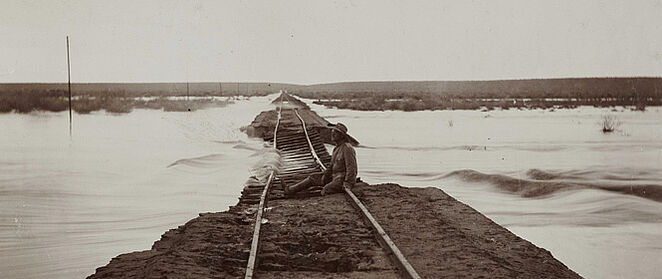THE CULTURAL LEGACY OF GERMAN COLONIAL RULE

International multidisciplinary conference, 25 to 27 May 2016
This multidisciplinary conference jointly organized by the Freie Universität Berlin and the Deutsches Historisches Museum will explore social, economic, political, and cultural practices generated by African, Asian, and Oceanic individuals and groups within the context and aftermath of German colonialism.
Recent scholarship has shed new light on our understanding of the relationship between colonizer and colonized; the nature and complexity of "colonial governmentality"; the interplay between the colonial state and local institutions; and the connections between ideology, textual discourses, practices, and material dimensions. This conference is designed to contribute to the ongoing discussion of German colonialism with a fresh focus on the agency of those affected by German colonialism in Africa, Asia, and Oceania. By focusing on the history of contact, interaction, exchange, and mutual influence, this conference intends to contribute to current debates on transnational and intercultural processes and to highlight the ways in which the colonial period is embedded in larger processes of globalization, in particular the global expansion of capitalism, technology, and the Western legal framework.
Funded by Einstein Stiftung Berlin
Conference language
English
Venue
Zeughauskino at the Deutsches Historisches Museum
Registration
PROGRAMME
Wednesday, 25 May 2016
7 p.m.
Opening of the Conference
Alexander Koch, Deutsches Historisches Museum
Klaus Mühlhahn, Freie Universität Berlin
Keynote address
Colonies, Empires, Nations: A Twentieth-Century History
Prof. Frederick Cooper, New York University, USA
7.45 p.m.
Reception
Thursday, 26 May 2016
8.30–9.00 a.m.
Registration
9.00 a.m.
Address of welcome
Alexander Koch, Deutsches Historisches Museum
Klaus Mühlhahn, Freie Universität Berlin
9.15–10.45 a.m.
PANEL I:
THE SOUTH SEAS
Moderation: Vincent Houben, Humboldt-Universität zu Berlin
The Legacy of the German Language in Papua New Guinea
Craig Alan Volker, James Cook University, Australia
Language Politics in German Colonialism and Their Postcolonial Effects
Stefan Engelberg, Institut für deutsche Sprache, Mannheim
10.45–11.15 a.m.
Coffee break
11.15 a.m. –12.45 p.m.
PANEL II:
GERMANY
Moderation: Stefan Rinke, Freie Universität Berlin
An "Inclination Towards a Policy of Extermination" – Is There a Certain Style of German Colonial Rule?
Ulrike Lindner, Universität zu Köln
Material Memories of Empire: Coming to Terms with Colonialism in Germany
Britta Schilling, Universiteit Utrecht, Netherlands
12.45–2.15 p.m.
Lunch break
2.15–4.15 p.m.
PANEL III:
EAST AFRICA
Moderation: Ulrike Lindner, Universität zu Köln
Culture of Remembrance in Tanzania
Audax Mabulla, National Museum of Tanzania cancelled
Political and cultural Recollections of the German colonial past in Rwanda
Damien Rwegera, Paris cancelled
"Schaffe schaffe, Häusle baue": German Business and Settlers on the Kenyan Coast since the 1960s
Nina Berman, Ohio State University, USA
3–3.30 p.m.
Coffee break
3.30–5.30 p.m.
PANEL IV:
CAMEROON / TOGO
Moderation: Britta Schilling, Universiteit Utrecht, Netherlands
Writing under colonial rule
Patrice Nganang, Stony Brook University, USA
Togo – A Permanent colonial model?
Gilbert Dotsé Yigbe, Université de Lomé, Togo
Friday, 26 May 2016
9.30–11.00 a.m.
PANEL V:
NAMIBIA
Moderation: Nina Berman, Ohio State University, USA
Memorial Cartographies and Traveled Objects: Vestiges of Colonial Atrocities in a Namibian Landscape
Memory Biwa, University of Namibia
Monuments – And What Else? The Controversial Legacy of German Colonialism in Namibia
Werner Hillebrecht, Former Head of Archives, Namibia
11.00–11.30 a.m.
Coffee break
11.30 a.m. – 1.00 p.m.
PANEL VI:
CHINA
Moderation: Klaus Mühlhahn, Freie Universität Berlin
German Complex in Qingdao
Sun Lixin, University of Peking, China
Colonial Qingdao in Contemporary Chinese Writings
Lu Yixu, University of Sydney, Australia
1.00–2.00 p.m.
Concluding presentation and discussion
Mission Impossible?: Decolonizing Germany
Nikita Dhawan, Universität Innsbruck, Austria
